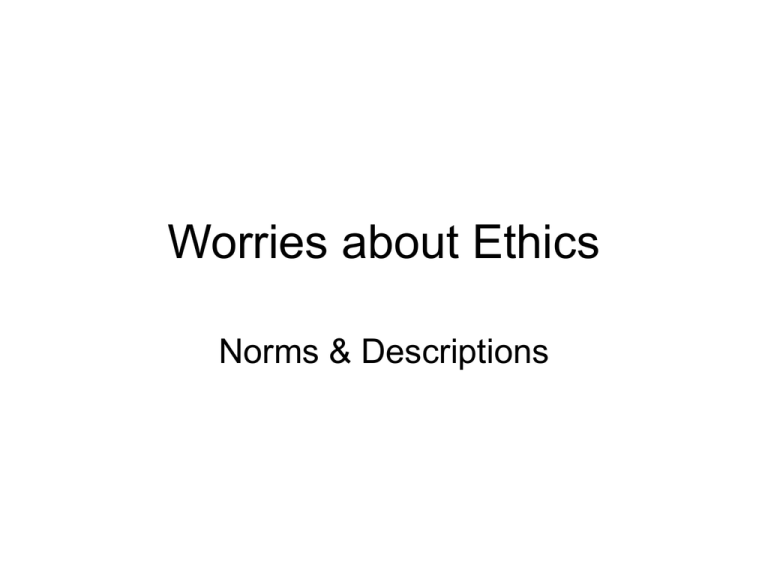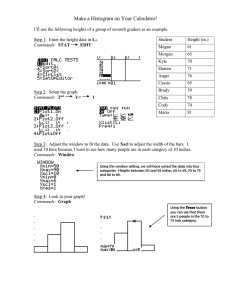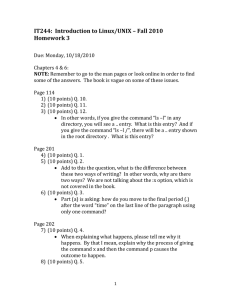Worries about Ethics Norms & Descriptions
advertisement

Worries about Ethics Norms & Descriptions Hume’s gap • In every system of morality, which I have hitherto met with, I have always remark'd, that the author proceeds for some time in the ordinary ways of reasoning, and establishes the being of a God, or makes observations concerning human affairs; when all of a sudden I am surpriz'd to find, that instead of the usual copulations of propositions, is, and is not, I meet with no proposition that is not connected with an ought, or an ought not. This change is imperceptible; but is however, of the last consequence. For as this ought, or ought not, expresses some new relation or affirmation, 'tis necessary that it shou'd be observ'd and explain'd; and at the same time that a reason should be given; for what seems altogether inconceivable, how this new relation can be a deduction from others, which are entirely different from it. The problem • The shift Hume describes runs from descriptions of the world (God’s existence, etc.) to claims about how things should be or ought to be. • This is an important shift, because there is no obvious or simple relation between these. • Sometimes (and in some respects) the way things are (the descriptive truth) is the way they should be (normatively correct). • Sometimes (and in some respects) the way things are is a way they should not be (normatively unacceptable). So how are these related? • Some theories of should/ought/etc. (the normative, in general) try to give a descriptive account of what makes ‘A should be the case’ or ‘We ought to do x in circumstances C’ true. • Such an account reduces the normative to the descriptive. • One such reduction is the Divine Command Theory, according to which what someone ought to do is whatever God commands. The Euthyphro • There is a standard objection (due to Plato) to this view. • It begins with the question ‘Is God’s command really what makes something right or wrong, or does she command what she commands because it is the right thing to do?’ • If God commands what she does because it is right, then there must be something about it that makes it right, something other than her giving that command. That is, the Divine command theory is false! • But if God’s command to do x makes x the right thing to do, this seems oddly arbitrary. God (in principle) could command anything, no matter how absurd, and it would simply and automatically be the right thing to do. God as ideal agent • People often respond to the Euthyphro by saying that God, of course, being good (perfectly so!), would never knowingly command anything that was wrong, and would always command what is right. • Further, being omniscient, God always knows what’s right or wrong. • So God’s commands will never lead us astray: by definition, whatever God commands is the right thing to do. • However, this just takes the first option: there is some separate, prior fact about what’s right or wrong, and, God (being perfect) recognizes this fact and responds to it as an ideal agent would. Upshot • The upshot of this position is that it’s not God’s command that really makes things right (or wrong). • Instead, God commands what she does because she knows that it’s right. • At least on this view, the fact that God commands we do x (in circumstances C) is a good sign (a perfect one, in fact) that doing x in C is right. • But this leads us to the next question: How should we go about figuring out what’s right or wrong? Alternatives • On this theory, God’s command is a perfect guide. But how should we go about deciding what it is that God commands? Directly (by looking for evidence that God commands that we do x in C) or indirectly (by looking for evidence that doing x in C is the sort of thing (i.e. a good thing) that God commands? • God (being omniscient) knows everything too. So in principle we can go about studying the world by the ‘direct’ route of asking what God believes about it. Whatever God believes will be the truth! Matters of fact • But on most matters of fact, at least, trying to figure out what’s true by asking ‘what does God believe about this’ is pointless. • After all, simply looking at the world and studying the facts works pretty well, as far as we can tell. • And furthermore, we don’t have any useful evidence for what God believes about (say) the melting point of lead other than what we gain by measuring the temperature of lead as it melts (or freezes). The Direct Route to God’s Command? • Is there a direct route to knowing what God has commanded? • The obvious answer is to look at some ‘holy book’ or other tradition of religious authority. • Of course, this raises a serious problem: Which book? Which tradition? • And it’s a problem that matters, at least insofar as correct religious observance is concerned. Deuteronomy 13: 6-10 (RSV) • If your brother, the son of your mother, or your son, or your daughter, or the wife of your bosom who is as your own soul, entices you secretly, saying, ‘Let us go and serve other gods,’ which neither you nor your fathers have known,…you shall not yield to him, nor shall your eye pity him, nor shall you spare him, nor shall you conceal him; but you shall kill him; your hand shall be first against him to put him to death, and afterwards the hand of all the people. (& likewise for entire cities that have been led astray—13: 12-16) The point • This is not to suggest that Christianity or Judaism today actually acts in accordance with this demand. • But only to show that it’s not simple to decide just how a traditions’ teachings should be understood, if we find such murderous declarations unacceptable. • And if we shift to thinking in terms of what we believe a benevolent, kind, good God would really want us to do, then we’re pursuing the indirect route: looking at the world, and at human beings, and trying to decide what’s best. The Indirect Route • So is there an indirect route to evidence about what God commands? • God is supposed to be good, benevolent, etc. • We have some notion of what this means when we apply it to people. • If we pursue that understanding, refining it and building on it (examining what sorts of things good people do when they’re not acting out of character or in ignorance, and so on), then maybe we will have a good starting point, at least!

